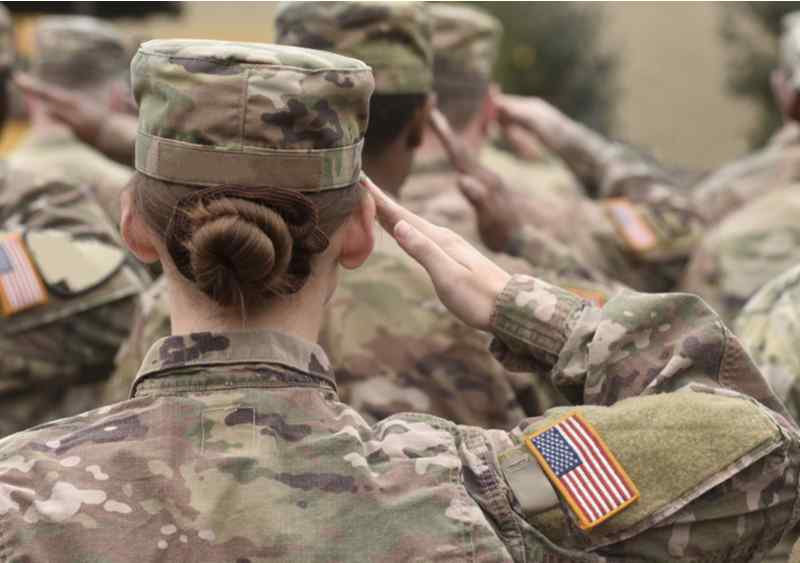Changing Careers from Military to IT
The information technology sector provides many opportunities for veterans who want to switch to a new satisfying career. This article will guide you through all the necessary information veterans need to make a smooth career change and succeed in the information technology industry.
Transferable Military Skills for IT Careers
Many of the skills you used to solve problems in your military life can come in handy in the workplace, even if the issues themselves are very different. Here are some of the transferable skills you may have picked up in the military.
Analytical Thinking and Problem Solving
One skill shared by many Veterans is the ability to identify, analyze, and define problems and then develop achievable solutions.
Problem-solving skills are critical in all fields, including the tech industry. Hiring managers want to know if the applicant has a logical and creative approach towards a problem. During the interview process, tech companies may test for problem-solving skills using puzzles.
Interpersonal Skills and Team Work
Teamwork is crucial in the military. To have a high-performing military team, interpersonal skills such as working together and understanding one another play a considerable role in success.
Interpersonal skills are essential in IT because IT specialists must build good relationships with their colleagues and understand and support their clients.
Leadership

The United States Army has top-notch leaders. Veterans have the ability to lead others and themselves in the right direction.
The business world values leadership skills as well. The tech industry needs influential leaders that can communicate well, delegate responsibilities, motivate their team, and solve problems in an ever-changing industry.
Accountability
Leadership also means accountability. Leaders build a culture of accountability where people hold each other accountable for the commitments they make. When every employee is held liable, the organization will thrive. It also allows coworkers to count on each other such as in meeting deadlines and fulfilling duties.
Time Management
Leadership not only means managing your own time but also the time of those you lead. In the army, similar to the workplace, leaders assign checkpoints and deadlines in a realistic timeframe to increase employee efficiency and productivity as much as possible.
Conflict Management
In the military, conflict management skills are crucial to reduce violence and resolve conflict.
Veterans have the ability to effectively clarify a disagreement and establish a common ground to resolve conflict in the workplace. They can also determine the responsibility of each party to find a resolution and strengthen the bond among employees.
Strategic Planning
Military strategic planning is the implementation of a set of ideas to pursue desired goals.
Strategic planning skills can be implemented in the IT career. Veterans can set a vision for the company, decide what actions each employee should take, and realize it through small achievable goals.
Self-Motivation
Self-motivation helps soldiers persevere when the challenges seem overwhelming. Self-motivation keeps soldiers engaged and dedicated when they have a mission to accomplish, such as working in harsh, unfamiliar environments under highly stressful and urgent situations.
Veterans' sense of self-motivation is unique because they develop it as lives, freedoms, and security are at stake. They can leverage their self-motivation skills into their roles as IT specialists and be proactive.
Commitment, Dedication, and Loyalty
Upon entering the military, soldiers take an oath to serve. Soldiers make a personal commitment to themselves as part of the military to stay dedicated and loyal to their country and defend it.
Veterans are more likely to succeed and reach their highest potential in their new career as IT specialists thanks to their refined ability to honor a commitment.
Adaptability and Flexibility
Adaptability is the ability and willingness to:
anticipate the need to adapt to the surrounding environment
prepare for change
implement adjustments in a timely and effective manner
Soldiers are continually faced with uncertainty, constant change, and the inability to predict where and how the military will be called upon. Those unpredictable circumstances increase the military's adaptability and flexibility skills.
Veterans can adapt to changes and new working environments quickly. This means that they can also respond effectively to their new working conditions in the tech field.
Integrity
Veterans share the valuable skill of integrity. In the military, they had to respect and follow policies, rules, and regulations. They learned to do what's right even when nobody was looking, lead by example, and be accountable for their mistakes or miscalculations.
Many Veterans are honest and truthful in what they say and do. Having integrity lets them foster a positive work environment in the tech industry and have an ethical approach in the workplace.
Military and IT Career Similarities

Veterans who have chosen their Military Occupational Specialty (MOS) in the field of communications, data, or cyber operations will find a lot of similarities when working as IT specialists.
Veterans whose MOS was in data systems were responsible for the design, connection, and operation of communication networks. They were also trusted to install, diagnose, repair, adjust, and modify electronic equipment and systems similar to the job of an IT professional.
Veterans who specialized in communications performed preventive maintenance on both hardware and software systems, including telephone, teletype, switching, radio, cryptography, and computer systems.
Cyber soldiers know to execute cyberspace operations, conduct computer network defense, and detect malicious activity on the electromagnetic battlefield using advanced military networks and cyber weapon systems.
Even if a veteran's MOS wasn't in the fields mentioned above, there are a lot of military and IT career similarities such as:
- Being able to work well under pressure and meet deadlines
- Being able to work well as part of a team
- Being skilled at problem-solving and decision making
- Being a good communicator
- Having patience
- Having time management skills
- Having good judgment
Top IT Jobs Suitable for Veterans
Veterans interested in working in the field of IT have many options from which to choose. Below are the top 11 IT jobs suitable for Veterans.
| IT Jobs | Average Salaries | Benefits |
|
Helpdesk Analyst |
$40,500 - $50,000 |
Health Insurance, Life Insurance, Vision Insurance, Dental Insurance, Disability Insurance, Paid Time Off, 401(k), 401(k) Matching, Tuition reimbursement, Paid Time Off, Gym Membership |
|
Technical Support Specialist |
$50,980 - $62,770 |
Health Insurance, 401(k), 401(k) Matching, Vision Insurance, Dental Insurance, Disability Insurance, Paid Time Off, Work from Home |
|
Web Developer |
$69,430 - $124,480 |
Health Insurance, 401(k), 401(k) Matching, Vision Insurance, Dental Insurance, Disability Insurance, Paid Time Off, Work from Home |
|
System Engineer |
$77,875 - $122,000 |
Health Insurance, 401(k), 401(k) Matching, Vision Insurance, Dental Insurance, Disability Insurance, Paid Time Off, Tuition Reimbursement, Parental Leave |
|
Video Game Designer |
$70,000-$90,000 |
Health Insurance, 401(k), 401(k) Matching, Vision Insurance, Dental Insurance, Disability Insurance, Paid Time Off, Tuition Reimbursement, Parental Leave |
|
Network/System Administrator |
$82,050 - $130,720 |
Health Insurance, Life Insurance, Vision Insurance, Dental Insurance, Disability Insurance, Paid Time Off, 401(k), 401(k) Matching, Tuition reimbursement, Flexible Schedule |
|
Computer Programmer |
$84,280 - $112,120 |
Health Insurance, Life Insurance, Vision Insurance, Dental Insurance, Disability Insurance, Paid Time Off, 401(k), 401(k) Matching, Tuition reimbursement, Flexible Schedule |
|
Business/Systems Analyst |
$88,740 - $142,220 |
Relocation Assistance, Commuter Assistance, Adoption Assistance, 401(k), 401(k) Matching, Paid Sick Time, Health Insurance, Health Savings Account, Vision Insurance, Dental Insurance |
|
Database Administrator |
$90,070 - $138,320 |
Paid Time Off, Health Insurance, Vision insurance, Gym Membership, 401(k), 401(k) Matching, Health Savings Account, Tuition Reimbursement |
|
Information Security Analysts |
$98,350 - $170,444 |
Commuter Assistance, 401(k), 401(k) Matching, Gym Membership, Tuition Reimbursement, Health Savings Account, Disability Insurance, Vision Insurance, Dental Insurance, Health Insurance |
|
Application Developer |
$103,620 - $166,960 |
Health Savings Account, Health Insurance, Vision Insurance, Dental Insurance, Disability insurance, Gym Membership, Tuition Reimbursement, 401(k), 401(k) Matching, Work from Home, Paid Time Off |
Training for an IT Job
Veterans who have received training in IT may find it easier to land a job in the field. Training for an IT job allows you to learn new skills and qualifications that interest hiring managers. Consequently, training for an IT job will help you start your new career in information technology.
IT Training Courses

When browsing the internet, you will come across many paid and free IT training courses. Below are the top five training courses for Veterans who want to pursue a career in IT.
Google's IT Support Professional Certificate
The IT Support Professional Certificate program developed by Google is specifically designed to help people start a new IT support career. The program is comprised of five courses:
- Technical support fundamentals
- The bits and bytes of computer networking
- Operating systems and you: becoming a power user
- System administration and IT infrastructure services
- IT security defense against the digital dark arts
It takes an average of six to eight months to complete the program; however, you can achieve it at your own pace. Google's IT Support Professional Certificate program costs $294, and applicants can receive financial aid.
Those who complete the program will get an official certificate recognized by many companies in the industry. And when you complete the program, you have a direct path to employers who are eager to consider you for their open IT support roles.
This course is designed to give you the skills necessary to land a job as an IT specialist. This is a great way to start a career transition because this is an excellent introduction to the world of tech and how it works.
CyberCorps Scholarship for Service
Veterans interested in cybersecurity can enroll at the Scholarship for Service (SFS) Program. The length of the CyberCorps program is three years. Veterans can walk away with an undergraduate or graduate education in the field of cybersecurity. Upon graduation, veterans have to work for the U.S. Government in a position related to cybersecurity in return for their scholarships.
The National Science Foundation founded the CyberCorps program. It aims to create a pipeline from college to the government workforce.
Microsoft Learn

Microsoft Learn offers free and interactive training. Veterans can choose from more than 1,000 courses and sharpen their skills in various technologies, learning from modules based on real-world scenarios.
Veterans can also get hands-on experience using the Microsoft Learn sandbox. They can prepare themselves to earn Microsoft certification in:
- Power Platform
- Data
- Cloud
- Security
- Artificial intelligence
- Azure
- Power Bi
- Xamarin
- Kubernetes
- Business applications
- Windows development
All the modules are concise and interactive. You can complete most of the modules in 15 to 60 minutes.
Oracle University
Oracle university delivers free and paid comprehensive training for the entire stack of Oracle products and technologies such as applications, middleware, database, operating system, virtual machine, servers, and storage.
The Oracle University training content is created in collaboration with the product experts at Oracle, who are also responsible for product development. Courses are delivered by expert instructors who have real-world experience with the products. Each class is designed to give students the expertise needed to maximize the use of technology features and improve overall productivity.
Oracle University also offers over 130 industry-recognized certification credentials to validate your expertise with a particular Oracle product or technology.
Oracle offers training in more than 200 educated centers located worldwide or via interactive live virtual class and on-demand formats.
IBM Training and Certifications
IBM is a technology innovator, a global leader in cloud platforms and AI, and is one of the world's most important research organizations.
IBM provides more than 100 free training courses online, such as:
- Introduction to data science
- Analyzing data with Python
- Developing cloud applications
- Advanced machine learning
- Basic system programming
- Cyber threat intelligence
- IBM also provides hands-on labs and product sandboxes to help build critical skills.
Challenges Veterans Face After Changing Careers
Making a transition from a military career to a civilian job may be challenging, especially for disabled Veterans in the U.S. One of the most prominent challenges veterans face after leaving the military is their inability to identify and clarify what they did in the military into a language that civilian recruiters will understand.
The military has its language, and often, Veterans don't know how to translate their field service experience without using military jargon. The same applies to cover letters and job interviews. Some Veterans have never applied or interviewed for a civilian job before joining the military.
Veterans may also find it challenging to learn how to be a civilian again in the corporate world's unfamiliar culture. They may also experience culture shock because the civilian work is very different from what they are used to.
Veterans may also find themselves lacking the proper education. However, as mentioned above, there are many online training courses available for Veterans to help their career transformation be as smooth as possible and succeed in their new career as civilians.
Despite these difficulties, Veterans are well-equipped to enjoy a successful career in the IT sector. While training may be necessary, these services are available if you know where to look. We hope our guide helps make the transition as easy as possible.





